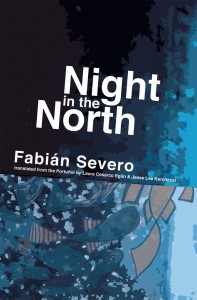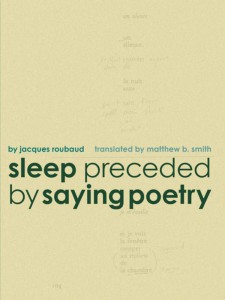These last few weeks of winter will be known as the time of stockpiling, and as countries around the world are shutting doors in response to COVID-19, stores are being cleared out and preserved goods and household necessities are piled up in cupboards. But just as it is vital to care for your body in these perplexing times, it is equally important to nurture your mind. So it is with that in mind that we present the newest and brightest in translated literature from around the world, in hopes that what is available to us remains our compassion, our desire to understand one another, and the privilege to travel amidst isolation. Below, our editors present a book of poetry written in a defiant border-language, a poignant Turkish critique of human cruelty, a Colombian novel depicting a young girl’s inner wildness, and the latest translated poems of Jacques Roubaud, written in the Oulipo tradition of valuing absence as equally as presence.

Night in the North by Fabián Severo, translated from the Portuñol by Laura Cesaro Eglin and Jesse Lee Kercheval, Eulalia Books, 2020
Review by Georgina Fooks, Communications Manager
How do we choose which language to write in?
For some of us, that choice can be fraught. Whether you’re a child of immigrants (as I am), or from a contested border region (as Fabián Severo is), there is a great deal at stake when making that choice. It impacts your identity, it shapes your politics. There’s no doubt that when reading this collection, Severo’s decision to write in Portuñol is a political act.
Portuñol, or Portunhol depending on whether you use a Hispanic or Portuguese spelling, is the language of the border region between Uruguay and Brazil. It has only recently begun to take root as a literary language; Fabián Severo is one of the only major Uruguayan poets to write in Portuñol, a language widely spoken on the border but possessive of a contested history. In the Translators’ Note at the end, Laura Cesaro Eglin and Jesse Lee Kercheval note that Severo’s decision to write in Portuñol forms part of his fight against the ways in which Portuñol has been stigmatised in Uruguay. During the military dictatorship in Uruguay from 1973-1985, signs were displayed reminding parents to speak in the official—and dominant—Spanish, rather than Portuñol.
This history surfaces in anecdotes throughout the collection, and shows how writing can be an act of resistance. Severo’s persistence in writing this book is an act of inscribing Portuñol into literature, carving a space for it as a real, legitimate language that is capable of great art. Night in the North feels like a poetic memoir, or a testimony of the experience of living on the border, on the edge of the world in this liminal space. “One” opens the floodgates to a sea of memories about Artigas, the town just on the edge of Uruguay and Brazil. In the opening set of poems, we are presented with a series of vignettes that paint a picture of isolation and marginalisation. In “Three,” Severo sums up the central predicament of living in Artigas:
The ground we walk on isn’t ours
nor is the language we speak.
But there’s a certain defiance, too, beyond the decision of language—the poetic subject reminds us that “Artigas has a language no one owns.” There’s independence and strength in Portuñol, whose very existence is an act of resistance:
My tongue sticks out its tongue at the dictionary
dances a cumbia on top of the maps
The play on the secondary meaning of “tongue” as language reinforces the rebellious act of speaking Portuñol and the joyousness found in that defiance—and they dance the cumbia, a dance popular in the Southern Cone that grounds the work in a regional specificity.
The collection also explores the idea of Uruguayan identity, alongside the Artigas identity that the poet espouses. In “Thirteen,” we see this tension at the core of the poet’s identity:
Before
I wanted to be Uruguayan.
Now
I want to be from here.
There’s a question left unsaid in this poem—is it possible to be from “here” at all? Uruguay is a very centralised country, with dominance and importance attributed to the capital Montevideo, and in this city far from the capital, there is an isolation that is instilled by geography and language, but the poet is asserting his identity as a speaker of a minority language, and as a resident of Artigas.
While the opening poems are powerful in their staccato nature, it’s the longer poems in the second half of the collection that hit the most powerfully; the poet explores the question of what you do when your identity is rejected, cast out as other, non-official, illegitimate. This comes out in the stories he tells, and it’s clear that this sense of othering is also socio-economic; there are tales of growing up in poverty, and scenes where speaking in Portuñol is stigmatised by his teachers. “Thirty-two” is a heart-rending account of a young boy who can’t afford his uniform, and whose teachers mock his accent:
Did you notice the sing-song in his voice?
That’s not how we should talk
It’s these formative childhood memories that leave their mark on the young poet and on us as readers, reminding us that language is always political.
The translators behind the work have put a great deal of thought into how to translate Severo’s work, and it shows in the presentation. In their note, they mention that they considered translating into Spanglish—but in Spanglish, speakers move from one to the other in a form of code-switching. Anyway, Portuñol is not a dialect, but a language in its own right: Severo’s poetry is testament to that.
It’s an important choice to have placed the translations side-by-side with the original poems, when the choice of language is such a subversive and assertive political act; it reminds us of the context from which these poems were born. Readers who may have familiarity with Spanish or Portuguese can trace the echoes, but will also witness that this is a language in its own right. Portuñol is a crucial element of the border culture that Severo is striving to represent, and the translations would feel lost without this crucial context.
What this collection does so well is to intertwine the personal and the political. For while it might be easy to reduce this collection to a book about the border, a book about language, but “Sixty” sums up exactly what the poet seeks to remind us of:
We are the border
more than any river
and more
way more
than any bridge.

Serenade for Nadia by Zülfü Livaneli, translated from the Turkish by Brendan Freely, Other Press, 2020
Review by Daljinder Johal, Assistant Managing Editor
Zülfü Livaneli’s heart-wrenching and thought-provoking historical novel, Serenade for Nadia, is a moving yet intelligent critique of humanity’s capacity for cruelty, particularly when in power, but does so by focusing on the unfair treatment and eventual tragedy of individuals.
In 2001, Maya Duran, a divorced mother of one, is tasked by Istanbul University with entertaining elderly German professor Max Wagner as he returns to the city after many years. At first, the novel seems like an almost cliché thriller; an isolated and frustrated Maya is charmed by the mysterious professor, as government agents demonstrate a newfound interest in her with the intention of coercing her into spying on her guest.
The eponymous Nadia is eventually revealed to be the German Catholic professor’s beloved Jewish wife, and their ill-fated love story allows Livaneli to shed light on a real-life disaster in 1942—caused by various politics alliances and enemies, Turkey and the British leaderships prevented the Struma, a ship overcrowding with 769 Romanian Jewish refugees, from reaching Palestine. Hauled out to sea and torpedoed, the sheer amount of human death and suffering is emotionally challenging to read, especially in conduct with Max’s personal reaction to the tragedy.
Nevertheless, Livaneli cleverly juxtaposes this historical story with Maya’s life. While the book at times loses focus by juggling many important and relevant themes, like modern parenting and relationships or how cities and governments (at least seemingly) change, the reader increasingly becomes eager to discover Max’s story, keeping the novel from feeling like a history lesson.
As a work of translation, this edition also provides an enjoyable surprise as the historical story is told deliberately by Maya “as a separate section of my book in a form that is very often encountered in Eastern literature.” While Maya and Max’s conversation of Eastern versus Western literature is frustrating as the reader is impatient to delve into the historical story, this idea of celebrating both a unified community and the differences of the individual is a key pull of the novel.
As the work of a Turkish author, it benefits from rich details of Turkish life, as well as its history and politics. The buzz and overwhelming nature of the city feels palpable, and propels the thrilling pace of the story on. In slower moments of reflection, however, the text reflects more deliberately to recognise that languages like Persian (or English) hold more power in literature as a whole, and to draw attention to the easily-missed beauty of works in lesser-known languages. Livaneli applies this critical eye to the people who use religion or government for evil or personal misuse, as well as those who use it to save others or improve society.
Serenade for Nadia packs both emotional impact and compelling philosophical arguments in a relatively short space, but has the undesired consequence of leaving our protagonist Maya feeling underdeveloped. Her friendship with Max is refreshing, as male-female platonic relationships are sadly rare in literature and in life, yet this intense focus on Max and the resultant effects of his presence on her humdrum day-to-day problems with her distant son, Kerem, feels rushed. It’s hard not to feel a little cheated of delighting a little more in their moments of domestic bliss. When Maya faces injustice and discrimination as a woman in a patriarchal society, her anger comes out rather one-note, as a character instead of capturing the emotional complexity of a woman. Similarly, Kerem becomes too conveniently interested in helping Maya with her research into the tragedy.
In an excellent and knowledgable book, Livaneli has a talent for impassioning readers to call for justice against governments that continue to suppress poor and marginalised groups, as he explores universal and, sometimes unfortunately repetitive, human experiences such as love, war, hate, death, self-discovery, and more. Nonetheless, it’s sometimes the minutiae of life, which helps a reader fall for characters as much as they do with each other that resounds—Max, falling in love with his dark-haired Nadia from afar, and as they spend their afternoons studying together.

Animals at the End of the World by Gloria Susana Esquivel, translated from the Spanish by Robin Myers, University of Texas Press, 2020
Review by Josefina Massot, Assistant Managing Editor
I’m not much of a Freudian, but I like Sigmund’s musings on civilization. He, a staunch Darwinian, views it as a curb on animality: once beasts stirred by lust and rage (his famed eros and thanatos), we gradually shaped up so we could foster mutual bonds and thus guard against the outside world. We drafted laws that struck fear into our hearts and kept us from straying. We traded freedom for family, pleasure for protection. It was a Pyrrhic bargain: taming our ways has made us miserable, which is why our inner beast—starved but still breathing—will come back to bite us every now and then. That’s the gist of it, as I recall, and I recall it now (with considerable poetic license) because it serves to capture the brilliance of Esquivel’s debut novel.
Six-year-old Inés is a fearful little animal, a Chinese box of trepidations. She fears the cosmos, her country, her neighborhood, and the very walls meant to protect her from an imminent apocalypse—her house is an “infinite labyrinth” where dreams seep into wakefulness, rooms are faded copies of each other, and her own pesky doubles run amok. This Borgesian nightmare aptly hosts its own minotaur, Inés’s grandfather-cum-beast:
If I was unlucky enough to cross its path, it would bare its teeth and unhinge its jaw. It would bring its canines very close to my face and threaten to swallow me up. I could sense its insatiable hunger for my flesh. It salivated (. . .). Maybe it expected me to talk back, to yell, to reach out and give it a thwack. But I felt paralyzed by its rage (. . .), my belly cold and quivering. I collected my fear in my mouth, along the edge of my loosest teeth, and I stifled my screams. I accepted its smacks and clouts.
Inés’s fears ensure self-preservation, but they also preserve the status quo—a microcosm ruled by bonds that make her miserable. It’s not just her grandfather; her mother and grandmother practice subtler forms of oppression. They ask her to be quiet, to wear cramped shoes and dresses, to sit like a lady.
Yet almost from the get-go, Inés’s own beast starts rearing its horny head. As much as she dreads her grandfather, for instance, she catches a glimpse of the “wrinkled bulb” between his legs and can’t help but stare, feeling “the urge to move closer and touch it.” Even her usual response to his assaults (she pees herself in terror) is sexually charged: “The warm drops would soak through my underpants before they fled and trickled down my legs. It was a yellow pain. Exquisite. Deep.”
Then Maria and a semi-absent father come along to shake things up. Maria is the maid’s granddaughter and a walking affront to her name’s holy overtones—a “girl-panther” who befriends Inés and helps her shed her fears. It becomes apparent that their bond might be just as much eros as agápe:
She rolled onto me and we became a tangle of legs, arms, and drowning tongues. We were Siamese twins, linked at the head, and with each brusque movement, each attempt to unravel ourselves, I felt a sharp yank that rattled my teeth. The spasms were a quiet throb. Placid. Red . . . Thrilling. A suffocation pulsing near the thighs.
The same (and much more) could be said about Inés’s relationship with her father, whose potential disappearance she likens to the end of the world. She hopes he’ll “whisk her away” from home like “a swooning bride on her wedding night,” blushes at the thought of sharing his bed, and drools at “the soft touch of his hands”—the novel is filled with such Oedipal discourse. A more explicit scene leaves little room for doubt: when she catches him with his head buried in her mother’s legs, “scrubbing his beard against her skin, just as he did in our games,” Inés has her second orgasmic experience.
As her lust grows and her fear recedes, rage begins to take hold. She becomes more forceful with Maria, starts challenging her mother and grandmother, and even attacks her grandfather. Nothing compares to the final showdown, though, after her father seems to scorn her for her friend at her seventh birthday party. It’d be criminal to spill the actual details (it’s an epic scene), but I’ll say this: her lust turns to bloodlust, and then—apparently—to tragedy. It looks like Dad may have left for good, laying waste to the world as she knows it. The feared apocalypse strikes from within.
And yet, if etymology serves, it’s less an ending than a revelation. Inés finally steps out of the house of horrors, resigned to her father’s abandonment, and a brave new world unfolds before her. She reciprocates:
I lifted my head until the sun’s slender halo stroked my hair. I bared my teeth and opened my eyes. I wasn’t afraid to look straight into the sky.
Inés trades family for freedom and protection for pleasure, fleeing any lasting semblance of civilization to bask in her urges. Her animal nature is fully exposed.
This anti-Darwinian climax speaks to Esquivel’s courage as much as her protagonist’s. Written from an adult standpoint, the novel could’ve easily qualified the “excesses” it depicts; it could’ve bowed down to political correctness, as art often does. Instead, its author also opts for straight-up revelation, and like Inés, we can’t help but look right at it—or hear, smell, touch, and taste it, since the whole thing is a sensual feast. A lesser writer might’ve fed us lavish prose to match it, too, but Esquivel knows the power of contrast. Her words are stripped to the bone, and they glisten—or perhaps I should say Myers’s words, which can be best praised through negation: as a native Spanish speaker, I’ll browse through originals when reading their English translations (even great ones will flounder at times), but I didn’t feel the need to do that once here. Myers has spawned her own mighty beast.

Sleep Preceded by Saying Poetry by Jacques Roubaud, translated from the French by Matthew B. Smith, La Presse/Fence Books, 2019
Review by Rachel Allen, Assistant Blog Editor
Part of the Oulipo game has always been relieving what is not in virtue of what is. Writing by rules, often of substitution or elimination, members of the “Ouvroir de littérature potentielle,” or “workshop of potential literature,” are more committed than most to negation. It is a formalist project by definition, prioritising formal absence. (Surely the most famous Oulipo product is Georges Perec’s lipogrammatic 1969 novel La disparition, composed without the letter “e”.) Positive formulation—write a novel by knight’s tour; compose sixty-one masturbation scenes, each in a different literary style—may shift the emphasis of a compositional principle, but in every case, a rule excludes something. Fundamentally, constraint is negative, and carries with it the idea of whatever it is meant to preclude. What is it we ought to address, then, when talking of Oulipo poetry?
Jacques Roubaud, a mathematician as well as a poet, has been affiliated with Oulipo nearly since its 1960 founding by Raymond Queaneau and François Le Lionnais. For decades now—since the death of his young wife Alix—he has been involved in “the project,” a now-seven-volume self-investigation regarding memory and loss. (Roubaud has not welcomed comparisons to Proust.) In the project’s prose, Roubaud “suppresses” the composition’s generative and structural constraints but details the procedural and biographical conditions of its composition, and although he refers openly to the constraint-suppression in the text itself, his gentility as a stylist is such that it is easy to forget the strictures for long passages. He more explicitly constrains presentation in his poetry; there, it would not be possible to forget the text’s involvement in an Oulipo exercise. But while Queneau may have relished the triumph of form over content in Exercises of Style, it would be unfair—and untrue—to call Roubaud’s ends strictly or even mostly extra-representational. That his writing has a subject, and a relation to a world not of its own making, seems obvious; to argue otherwise feels almost perverse, given the work’s emotional origins and textures. His apparent engagement with the world is what makes him alluring and, for me, more difficult to interpret than most Oulipans. Direct access coexists tensely with allusion, nominalism with platonism.
Translated reverently by Matthew B. Smith, Roubaud’s Sleep Preceded by Saying Poetry proceeds in two companion pieces, the long, essayistic poem of the first functioning like an introduction or apology for the more-restrained poem-sets in the second. Roubaud is accordingly more expansive in the first piece, more rhetorically available as well as wordier. In unpunctuated but sentential stanzas—arranged score-like by Roubaud and then Smith with intuitive intra-lineal spacing—Roubaud records sense perceptions and their adjacent memories, which are mostly of saying or hearing poetry.
That day with the sheet of paper
splitting the light rustling the wind the noise of
restless branches I thought I noticed an
agreement it seemed between the poems’
momentary existence as sound and this room
where one after another they took shape
Frequently, his perceptions have this synesthetic or spatialized quality, or rather their objects do. Light and sound are for him surfaces of interaction, inter-penetrable and permeable by tactile, sonic, and visual forces. (The next line of this stanza has “the translucent paper sheets / penetrated by silence.”) The specificity of sensation and memory in the first poem is important: Roubaud’s presence and his particularities as a perceiver (evidenced by the use of adjectives and personal pronouns, biographical details and idiosyncratic diction) ground the poem in recognizable subjectivity. Similarly, by populating this poem-world with proper nouns and citations, he creates a common, external world of particulars. (That we can all participate in calling up “a small room one day at the Charterhouse of / Villeneuve-les-Avignon” is not in spite of the memory’s specificity to the speaker, but because of it.) Roubaud’s efforts to taxonomize—to publicize, generalize, or universalize—certain repetitious features of reality, like language, silence, light, and night, are thus demonstrably grounded in individuated particulars.
The second piece is a single work in three series—called, respectively, sleep one, two, and three—containing thirty-one poems and five subseries apiece. After nodding to William Carlos Williams in an opening note, Roubaud tightens his grip on just a handful of themes, carried over from the first piece (and found elsewhere in his oeuvre). Adverbial descriptions and proper nouns disappear, as do most dependent clauses, in Roubaud’s paring of the poems down to their conceptual and lexical essences. “Sleep,” “light,” “yellow,” “night,” “dark,” “eye,” “drop,” “water,” and “silence” are combined and re-combined, as he relies on novel spacing and enjambment to generate interest with a sparse vocabulary. The nouns might be anyone’s, though their grammatically concrete application here renders them abstract, which seems to me a plausible encapsulation of the Oulipo’s aims. Abstracted away from the particular, linguistic entities shed representational significance and approach something mathematical, Platonic.
the dark
dark
dark
no
thing
e
ver
there
In the first piece, Roubaud repeats a tic, familiar from the project, of “neither-nor” description: “Saying poetry is not a private matter saying poetry is not a public matter.” Those are the terms, at least in part, by which I’ve come to read him. The negative theologian’s “neither-nor” circumscribes without predication, raising something formally covert to the level of semantics. Certain entities—poetry, selves, memories, and losses perhaps among them—cannot be adequately represented or defined, but are known only by the contours of their absence.
*****
Read more on the Asymptote blog:

